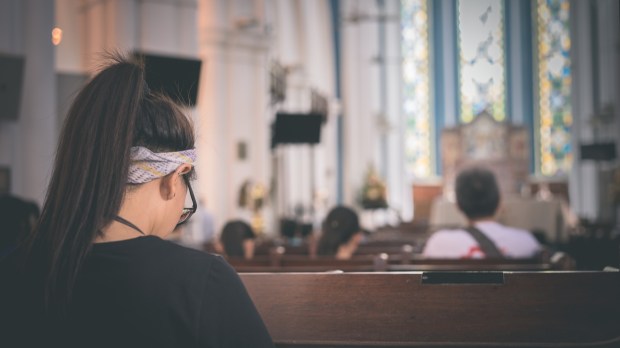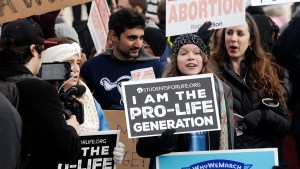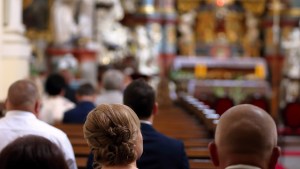A new report analyzing surveys taken by young Catholics in 2021 shows a distinct disconnect with traditional faith practice. The study, conducted by Springtide Research Institute, titled “The State of Religion & Young People 2021 — Catholic Edition,” examined Catholics aged 13-25. The report suggests new forms of outreach are required to engage those of Generation Z.
Of the more than 10,000 individuals surveyed, 1,630 identified as Catholic. Of these, 87% consider themselves religious while 85% called themselves spiritual. While these were promising figures, only 26% said they use faith as a guide when they feel uncertain about life.
Furthermore, 52% of young Catholics reported attending Mass once per year or less, and of these 27% said they never attend. Only 23% reported attending Mass weekly or more, and 19% were monthly attendees.
Organized religion
The study found that while the majority of young people identify themselves as religious or spiritual, they are moving away from organized religion. Fifty-four percent of respondents claimed Jesus Christ as their savior. Of these, however, the largest group (22%) consider themselves “just Christian.”
This distancing from religious institutions is coupled by a wide variety of non-traditional activities which this group considers religious practice. These included physical activity, mediation, art or music, being in nature, writing or acts of service.
Among young Catholics, listening to music and spending time with family and friends were cited as the most fulfilling activities. Also high on the list were caring for pets and spending time outdoors. Only 27% said that their faith provided fulfillment to their lives.
Faith Unbundled
The report also talks about “Faith Unbundled,” a term that describes a new trend of young Catholics drawing faith activities from an array of religious and secular traditions. The report describes “Faith Unbundled”:
“‘Faith Unbundled’ is a term that describes the way young people increasingly construct their faith by combining elements such as beliefs, identity, practices, and community from a variety of religious and nonreligious sources, rather than receiving all these things from a single, intact system or tradition.”
The report likened unbundling one’s faith to selecting music from a streaming service. One does not need to listen through a whole album at once, but instead can select a variety of tracks from many artists to create a playlist.
An unbundled faith could sound problematic, as the younger generation may draw in aspects of other faiths that may be contrary to Catholicism. On the other hand, this exploration of faith practice, combined with non-institutional worship, suggests a desire for faith.
Natalia Imperatori-Lee, a contributor to the report, suggested that this attitude could foster evangelization in Generation Z. She did, however, note that there may need to be adjustments in the way we approach the conversation:
“Too often we present faith to young people as a kind of checklist — if you do this and you don’t do that, then you’ll be Catholic. That’s a kind of sterile faith that doesn’t work with this generation.” She continued, “We need to present the Catholic life as an invitation to conversion, a passionate engagement with the world and with God that can be a life-changing experience. Young people are seeking meaning, not a slate of things to do or avoid.”
The pandemic
The coronavirus pandemic has exacerbated feelings of uncertainty in Generation Z. According to the report, the Church missed opportunities to draw the flock into the faith during this tumultuous time. Only 10% of Catholics aged 13-25 reported a faith leader reaching out to them during the pandemic. This number dropped to 6% in younger age groups.
About 20% said they stopped attending religious or spiritual services during the pandemic; of these, about 20% said they were happy the connection was lost. Only 23% of young Catholics said they felt safe to attend church during the pandemic.
Disconnect
The pandemic created a lot of uncertainty about life and the future for young Catholics, but few of them turned to the Church for grounding. The study asked a wide range of questions to ascertain the reason for this trend.
Fifty-four percent of respondents said they did not agree with some things the Church teaches, while 52% said they would rather discover answers for themselves than be told. Furthermore, 51% said they did not feel they could be themselves at Church, while a solid half said they had no idea how to become connected to a religious group.
Conclusion
The study suggests that while the younger generation is open to faith in their lives, they have not identified religious institutions as a place to find answers. The world pandemic and rising trend of “Faith Unbundled” have created hurdles for reaching Generation Z, but adjustments to methods of evangelization could be the solution.
The report suggested that the best way to reach the younger generation is to listen to their thoughts and questions. It is also important to revitalize outreach, in order to be a consistent and positive presence in their lives.



